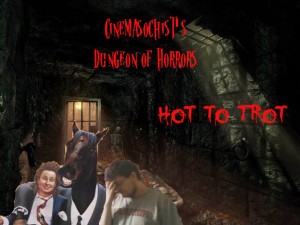
Bobcat Goldthwait takes financial advice from a talking horse voiced by John Candy. That’s the joke. Seriously. That premise is supposed to carry this film for eighty three minutes. The four writers (Stephen Neigher, Hugo Gilbert, Charlie Peters & Andy Breckman) didn’t bother to put actual jokes into the script and director Michael Dinner didn’t bother to clean it up. And yes, you read that right. It took four people to write this one-joke movie. Aye carumba!
Bobcat Goldthwait plays Fred P. Chaney, a skittish man (i.e. his normal shtick) whose mother just passed away. She co-owned a successful stock firm with her second husband, Walter Sawyer (Dabney Coleman). He was only using her for her money, as evidenced by him getting caught by Fred fooling around with Victoria Peyton (Cindy Pickett) two days after his wife’s death. He thinks he’s going to make it out with the entire company, but his outcast son-in-law gets half of the company and her prized horse, Don (John Candy).
Fred is offered a paltry sum of five-hundred and twenty-five dollars for his half, but it turns it down because he’s not an idiot. While badmouthing Walter in the horse stalls, Don begins to talk which, unsurprisingly, freaks Fred out. After he collects himself, he takes Don back to his family and leaves him there (he originally left his family because he didn’t get along with his father). Since the horse originally left and stumbled upon the Chaney family, he immediately goes back to the stalls and overhears a stockbroker discussing a hot item. He was conveniently there having sex with his girlfriend. You know, because there’s no better way to have sex than being surrounded by horse shit.
Don calls up Fred (who decided to work at the company) and gives him the tip and just like that he’s sitting on top of the world. He gets a brand new luxurious apartment (which comes equipped with an atrium, which he mistakes for a little yard). Once he finds out it was Don who filled him in, he sneaks him into his apartment and the two make money together. Are you laughing yet?
There are feeble attempts at humor throughout, such as Don’s sardonic wit, but none of it sticks. Dinner hopes the audience will be hooked by the premise and will accept anything thrown at them. Surely a scene where Don invites a few animal friends over and they trash the place, leading to Fred kicking them out and nearly running over his nosy neighbor will get a few laughs. Wrong! That’s the biggest gag in the film, folks. You see what I’m dealing with?
Admittedly, the one joke that does garner a chuckle is Don’s first human friend being a blind jazz singer. Don convinces him that he’s a young Irishman, then loses him after he stands too close to the edge on a speeding train and falls off. Okay, so that last part wasn’t funny. At least the first half was mildly amusing. Too bad that’s about it.
To the credit of the actors involved, they do their best. You can tell Goldthwait is doing this to cash in on his fifteen minutes of fame (which he thankfully proved he was more than a gimmick and became a fantastic director), but he holds his own. Dabney Coleman is having fun chewing up the scenery as Walter Sawyer. With the chompers he had, he could’ve literally done so. Virginia Madsen is fine as Allison Rowe, Fred’s love interest (because you can’t have a talking horse movie without a love interest), but she’s not given much to do. John Candy’s boisterous voice fits perfectly for Don, which is a shame there wasn’t actually any good dialogue to utter.
The worst thing about “Hot to Trot” is that it doesn’t take any risks. You’d think somebody would exploit the talking horse for money, which Fred even mentions. The writers brush this off by having Don say it’s not that easy. How isn’t it? If you were going to acknowledge something the entire audience was asking, why wouldn’t you come up with a better excuse? Oh, that’s right, you think the gimmick itself will sell and they’ll laugh at whatever’s put on screen. The joke’s on them; I didn’t.
Final Rating: D
The worst thing about “Hot to Trot” is that it doesn’t take any risks. You’d think somebody would exploit the talking horse for money, which Fred even mentions. The writers brush this off by having Don say it’s not that easy. How isn’t it? If you were going to acknowledge something the entire audience was asking, why wouldn’t you come up with a better excuse? Oh, that’s right, you think the gimmick itself will sell and they’ll laugh at whatever’s put on screen. The joke’s on them; I didn’t.
